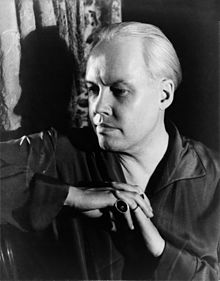Carl van Vechten
| Carl Van Vechten | |
|---|---|

Photographic self-portrait by Carl Van Vechten, taken in 1934
|
|
| Born |
June 17, 1880 Cedar Rapids, Iowa, U.S. |
| Died | December 21, 1964 (aged 84) New York City, U.S. |
| Education | Washington High School |
| Alma mater | University of Chicago |
| Occupation | Photographer |
| Spouse(s) | Anna Snyder (1907–1912), Fania Marinoff (m. 1914–64) |
Carl Van Vechten (June 17, 1880 – December 21, 1964) was an American writer and artistic photographer who was a patron of the Harlem Renaissance and the literary executor of Gertrude Stein.
Born in Cedar Rapids, Iowa, he was the youngest child of Charles and Ada Van Vechten. He graduated from Washington High School in 1898, and later the University of Chicago in 1903. In 1906, he moved to New York City. He was hired as the assistant music critic at The New York Times. His interest in opera had him take a leave of absence from the paper in 1907, to travel to Europe to explore opera. While in England he married his long-time friend from Cedar Rapids, Anna Snyder. He returned to his job at the New York Times in 1909, where he became the first American critic of modern dance. At that time, Isadora Duncan, Anna Pavlova, and Loie Fuller were performing in New York City. The marriage to Anna Snyder ended in divorce in 1912 and he wed actress Fania Marinoff in 1914. Their marriage lasted until the end of his life, even while his relationships with men were an open secret.
Van Vechten initially met Gertrude Stein in Paris in 1913. They continued corresponding for the remainder of Stein's life, and at her death she appointed Van Vechten her literary executor; he helped to bring into print her unpublished writings.
Several books of Van Vechten's essays on various subjects such as music and literature were published between 1915 and 1920. Between 1922 and 1930 Knopf published seven novels by Van Vechten, starting with Peter Whiffle: His Life and Works and ending with Parties.
...
Wikipedia
